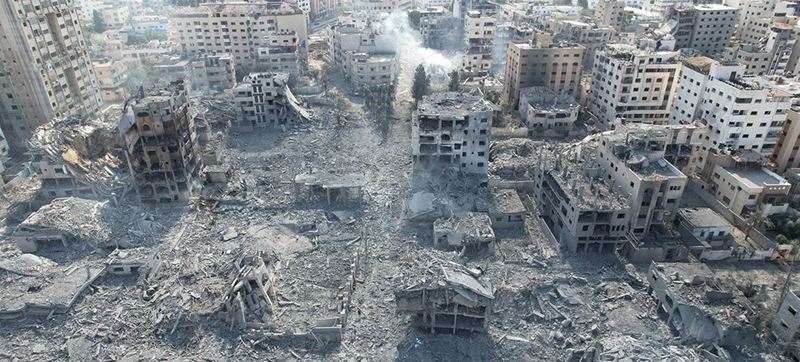UN chief appalled by ‘tragic human toll’ of ongoing Gaza war

The UN Secretary-General said on Thursday he was “appalled by the tragic human toll of the conflict in Gaza” where more than 30,000 people have now reportedly been killed and over 70,000 injured.
“Tragically, an unknown number of people lie under rubble," António Guterres added, in a statement issued by his spokesperson, reiterating his call for an immediate humanitarian ceasefire and unconditional release of all the hostages seized during the Hamas-led terror attack of 7 October.
“He once again calls for urgent steps so that critical humanitarian aid can get into and across Gaza to all those in need”, UN Spokesperson Stéphane Dujarric said.
Dozens killed waiting for aid
As the death toll passed another chilling total, conflicting reports emerged on Thursday over the death of more than 100 Palestinians waiting for desperately needed aid.
“Even after close to five months of brutal hostilities, Gaza still has the ability to shock us,” said UN relief chief Martin Griffiths in a post on X.
“I am appalled at the reported killing and injury of hundreds of people during a transfer of aid supplies west of Gaza City today,” he said. “Life is draining out of Gaza at terrifying speed.”
The Secretary-General also condemned the incident.
“The desperate civilians in Gaza need urgent help, including those in the besieged north where the United Nations has not been able to deliver aid in more than a week”, said the statement released by Spokesperson Stéphane Dujarric.
Intense Israeli bombardment from air, land and sea continues to be reported across much of the Gaza Strip, resulting in further civilian casualties, displacement and destruction of civilian infrastructure, according to the latest situation report from UN humanitarian agency OCHA.
Ground operations and heavy fighting between Israeli forces and Palestinian armed groups also continue to be reported, particularly in northern Gaza, Deir Al-Balah and Khan Younis, the report said.
Fears of Rafah invasion
Fears persist over the planned Israeli incursion into Rafah, where more than one million people are seeking shelter from the violence sparked by the Hamas-led terror attacks in early October that killed almost 1,200 people in Israel and left 240 taken hostage.
Rafah is under fire every day, said Georgios Petropoulos, OCHA’s head of the Gaza sub-office.
“We will do our best” to serve people in need with the resources at hand, he added. “We are needed here. We need people here to stand for hope and human dignity.”
Famine and health crises
Unless more aid is delivered, UN officials warned of an impending famine in Gaza. Local health authorities reported that six infants have already died as a result of malnutrition and dehydration, the OCHA report stated.
Besieged hospitals continue to grapple with raids and attacks, according to doctors trapped in the enclave who continue to serve patients as best they can.
As health centres and hospitals persevere amid raids and dangerous shortages of lifesaving supplies, a Palestine Red Crescent Society (PRCS) medical point in Jabalya, in northern Gaza, is receiving a daily average of 100 to 150 patients suffering from hepatitis A.
Meanwhile, stalled aid deliveries idle on border crossings with Egypt and Israel. Media reports indicate that Israel civilians were preventing trucks from entering Gaza at the Kerem Shalom crossing.
Massive deaths, injuries near aid trucks
Desperation among Gazans has multiplied as aid trickles into the enclave, with UN officials stating that the current, restricted deliveries do not even meet the minimum demands.
Early Thursday, it was reported that more than 100 people were killed in Gaza City, where aid trucks attempted to deliver food and other lifesaving supplies close to an Israeli checkpoint.
Initial reports from the Gaza heath ministry said that Israeli forces had fired into the crowd of thousands.
The Israeli Defense Force said soldiers had opened fire in a “limited response” to deter crowds from advancing on their checkpoint, but news reports suggest that amid chaotic scenes and a scramble for aid, many casualties were caused by trucks running people over.
Mr. Dujarric briefed reporters in New York and said the aid convoy involved was not part of UN operations. Responding to questions, he spelled out that "the way we operate right now is not safe"
"It is not safe for those who delivery the aid, it is not safe for people who receive the aid," he said. "This is a chaotic, opportunistic humanitarian operation that we are trying to run. We want to see an immediate humanitarian ceasefire so that we can distribute aid in an organized, predictable and safe manner, which is currently not an option."
Joint appeal to resume funding for UNRWA
Also on Thursday, 17 non-governmental organizations (NGOs) in the European Union (EU) signed a joint appeal to restore funding to the UN relief agency for Palestine refugees, UNRWA.
“We urge the EU and Member States to take note that other aid agencies cannot replicate UNRWA’s central role in the humanitarian response in Gaza, and amidst the current crisis many will struggle to even maintain their current operations without UNRWA’s partnership and support,” they said in a statement.
The joint appeal comes after major UNRWA donors suspended funding following Israel’s allegations that a dozen staff members were involved in the Hamas attacks in October that triggered the current devastating war in the enclave. The donors withheld funds pending ongoing independent UN investigations of the matter.
“The suspension of funding to the main aid provider for millions of Palestinians in Gaza will impact life-saving assistance for over two million people,” said UNRWA, which serves almost 6 million Palestinians in Gaza, the West Bank, Lebanon, Jordan and Syria, with education, healthcare and other essential services.
“Don’t look away from Gaza,” OCHA’s Mr. Petropoulos said. “Find the truth of what’s happening and believe in humanity. The only good thing war can do is to end.”



